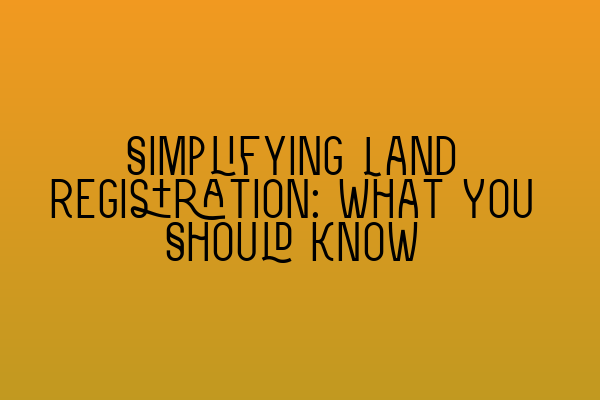Simplifying Land Registration: What You Should Know
As a property owner or someone involved in property transactions, understanding land registration is crucial. The land registration system in the United Kingdom is designed to provide security and clarity when it comes to property ownership. In this article, we will explore the basics of land registration and break it down into simple terms for your understanding.
What is Land Registration?
Land registration is the process of recording and documenting information about a property, including its ownership, boundaries, and any other interests or rights related to the land. It is a system managed by the Land Registry in England and Wales, the Registers of Scotland, and the Land and Property Services in Northern Ireland.
SQE 1 Practice Mocks FLK1 FLK2
Benefits of Land Registration
The land registration system offers several benefits for property owners and potential buyers. Let’s take a look at some of the key advantages:
- Protection of ownership: Once your property is registered, you have legally recognized proof of your ownership. This provides you with protection against disputes and fraudulent claims.
- Clarity of boundaries: The land registration process includes the precise mapping of land boundaries. This helps avoid conflicts between neighboring properties.
- Access to information: Land registration ensures that information about the property is available to the public. This allows potential buyers and lenders to make informed decisions.
- Simplifies property transactions: The existence of a registered title streamlines the process of buying, selling, or mortgaging a property. It reduces the need for lengthy investigations into ownership history.
The Land Registration Process
The process of land registration involves several key steps:
- Application: The property owner or their solicitor completes the necessary forms and submits an application to the relevant Land Registry.
- Examination and verification: The Land Registry examines the application, checks the details, and verifies the supporting documents.
- Official search: A search is carried out to identify any interests or rights that may affect the property, such as mortgages or easements.
- Notification of any interested parties: During the registration process, any parties with an interest in the land, such as lenders or neighboring owners, are notified and given a chance to raise objections.
- Registration: Once all checks and searches are complete, the Land Registry enters the property into the register and issues a title certificate to the owner.
Common Land Registration Keywords
To help demystify the jargon often associated with land registration, here are some common keywords you may come across:
- Title: A legal document that proves ownership of a property.
- Title plan: A map or plan showing the boundaries of a property.
- Charges: Any interests or rights that may affect the property, such as mortgages or restrictions. These are recorded against the title.
- Easements: Rights granted to someone allowing them to use or access another person’s land, such as a right of way.
- Restrictions: Limitations or conditions placed on how the property can be used, such as planning restrictions.
By familiarizing yourself with these keywords, you will be better equipped to understand land registration documents and discussions.
The Role of a Solicitor in Land Registration
As a property owner or buyer, it is advisable to seek the assistance of a solicitor who specializes in property law and land registration. A solicitor can guide you through the process, ensure all necessary paperwork is completed accurately, and address any legal issues that may arise.
If you need professional assistance with land registration or property transactions, our experienced solicitors at SQE Property Law & Land Law are here to help. Contact us to schedule a consultation.
To conclude, land registration is an essential aspect of property ownership. It provides security, clarity, and simplifies transactions. By understanding the key concepts and processes involved, you can navigate the world of land registration with confidence.
